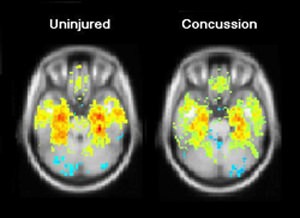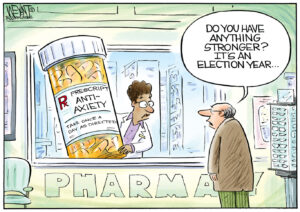Mild Head Injury Upsets Brain’s Resting State
MRI scans conducted by researchers at NYU’s School of Medicine have shown that the resting state functioning of brains that have suffered mild trauma corresponds to a host of problems, including cognitive dysfunction, depression, anxiety and fatigue.
MRI scans conducted by researchers at NYU’s School of Medicine have shown that the resting state functioning of brains that have suffered mild trauma corresponds to a host of problems, including cognitive dysfunction, depression, anxiety and fatigue.
Researchers led by Dr. Yulin Ge found that people with such injuries exhibit increased “connectivity” in the front of the brain and decreased connectivity in the back compared with those who haven’t suffered harm. The shift in connectivity may reflect the brain’s attempt to compensate for the injury, they said.
If the findings survive further tests, they will suggest that subtle, lasting effects of mild traumatic brain injuries sustained in combat or sports activities, for example, can go undetected in those who suffer them, leading to unrecognized and misunderstood personal and social problems.
“The abnormally increased medial prefrontal cortex usage over the long run … might lead to persistent psychologic symptoms, such as the depression, anxiety and fatigue seen in these patients,” researchers explained.
— Posted by Alexander Reed Kelly.
Your support matters…MedPage Today:
Compared with normal controls, patients with posttraumatic symptoms soon after mild TBI showed reduced connectivity in some regions, and increased connectivity in others within the network that the brain uses during inactivity for information processing and maintenance.
These abnormalities were associated with cognitive dysfunction, depression, anxiety, fatigue, and post-concussion syndrome, reported Yulin Ge, MD, of NYU School of Medicine in New York City, and colleagues in the December issue of Radiology.
Independent journalism is under threat and overshadowed by heavily funded mainstream media.
You can help level the playing field. Become a member.
Your tax-deductible contribution keeps us digging beneath the headlines to give you thought-provoking, investigative reporting and analysis that unearths what's really happening- without compromise.
Give today to support our courageous, independent journalists.






You need to be a supporter to comment.
There are currently no responses to this article.
Be the first to respond.